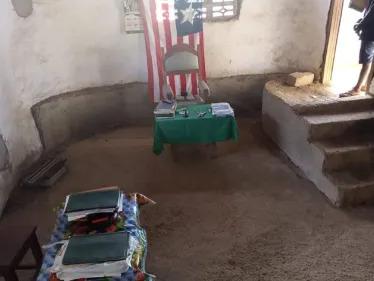Liberia: Chief Justice Laments Deplorable State of Magisterial Courts

— “These courts are housed in dilapidated, burned, or unfinished structures or squatting on the patios of private homes to conduct court business,"" the chief justice noted.
Chief Justice Sie-A-Nyene Yuoh has lamented the ‘shocking’ state of magisterial court houses across the country and has called on governments to urgently address the matter.
Speaking at the opening of the March 2023 Term of the Supreme Court, Youh said it is the responsibility of the government to finance the judiciary — ensuring that its facilities are functional and up-to-date.
Yuoh lamented the deplorable states of courthouses in five of the fifteen counties, Montserrado, Grand Bassa, Bomi, Gbarpolu Grand Cape Mount, which she , during recent tours, observed were in deplorable conditions.
The state of the magisterial courts in those places, Youh noted, pose serious health hazards to the magistrate, staff and party litigants.
She said those courts do not represent the image of the Judiciary or the government.
Yuoh noted that what she saw at these magisterial courts in the counties were so disturbing and worrisome for the country's justice system.
“These courts are housed in dilapidated, burnt or in complete structure or squatting on the parcel patio of private homes to conduct business of the courts,” the Chief Justice noted.
She however applauded the magistrates working with what she considered as" harsh working conditions.
“Given these harsh working conditions, we must applaud and commend these magistrates , and as the national government commit ourselves to alleviate such extreme hardship and embarrassment facing this coordinate Branch of the Government, the judiciary,” Yuoh pleaded with the government.
Yuoh expressed her deep disappointment that the magisterial courts built under the UNMIL Quick Impact project and in deplorable conditions have been for several years without any renovation or a modern facility being constructed to accommodate the courts.
“Let me quickly note here and, it is public knowledge that the quick impact project was a program designed to give immediate but temporary relief to the judiciary at a time the country was recovering from its civil crisis,” she recounted.
“Now for over 18 consecutive years of peace and tranquility coupled with the elections of constitutional government, it is time that these structures of our Magisterial Courts be improved and elevated beyond the quick impact stage to one that represents a national government with a functioning judiciary in every respect.”
Yuoh said the constitution gives the legislature powers to constitute an inferior court to the Supreme Court and the new judiciary law also gives the president unfettered power and discretion to expand the Magisterial Courts jurisdiction.
The Chief Justice added that over the years she has observed that the legislature and the president have created so many magisterial courts in counties that are geographically small and less populated, resulting in the clustering of these courts in those counties.
“Example is Sinoe County, one of the smaller counties with a very small population but still have more Magisterial Courts than populated counties like Montserrado, Nimba, Bong and Lofa,” Yuoh noted.
She said Sinoe County alone has 33 Magisterial Courts to include a Traffic Court and Grand Kru County has 28 Magisterial Courts.
“As a result magisteries in these counties are usually competing with each other for cases since the number of magisterial courts required for those counties are way above the need of the counties and in other instances so remote that it defeat access to justice., " the Chief Justice reminder her audience including President George Weah.
She noted that more detrimental to the judiciary is that most times the magisterial courts are created without the supporting budgetary allotments in terms of salaries for the newly appointed magistrates and their staffs.
“No allotment for infrastructures or logistics or other financial support to make these courts more visible and efficient. Still further, it is the Supreme Court, in situations like these that is left with the full financial burden and embarrassment,” Yuoh maintained.
